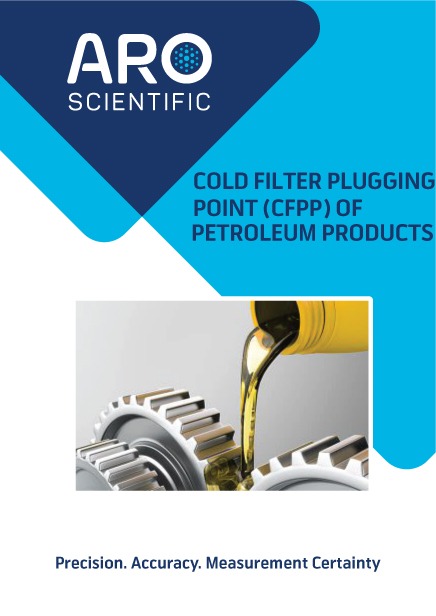Selecting the right Certified Reference Material (CRM) for your laboratory - Some considerations

Introduction to selecting the right Certified Reference Material (CRM) for your laboratory
In any analytical laboratory, precision and accuracy are paramount. Whether in pharmaceuticals, environmental testing, or petroleum analysis, the reliability of measurement results depends heavily on the quality of reference materials and calibration standards used in the laboratory. Certified Reference Materials (CRMs), reference materials and calibration standards are critical in ensuring accurate, reliable and traceable measurements, selecting the correct CRM for your laboratory's requires careful consideration.
In this blog, we’ll explore the key factors to consider when choosing a CRM and why ARO Scientific’s certified reference materials are trusted by laboratories worldwide.
Why choosing the right CRM matters
Certified Reference Materials (CRMs), reference materials and calibration standards are essential tools for method validation, method verification, instrument calibration, and quality control. A poor choice of CRM can lead to inaccurate measurements, regulatory compliance issues, and unreliable measurements. Selecting the right CRM ensures consistency, traceability, and adherence to industry standards and accreditation requirements, particularly important for laboratories accredited to ISO/IEC 17025.
Considerations when selecting a CRM
1. Compliance with International Standards
When selecting a Certified Reference Material (CRM), reference material or calibration standard, ensure that it is produced under internationally recognised standards such as ISO 17034. This accreditation ensures reference material producers can demonstrate their competence and expertise in producing reliable and traceable materials. In addition, it guarantees that the reference material is manufactured under strict quality control measures and is suitable for laboratory use.
Tip: Always verify that the CRM supplier is accredited by a recognised body, ensuring compliance with ISO/IEC 17025 for testing and calibration laboratories. Refer to the scope of accreditation of the reference material producer. Some marketing materials can be misleading.
Tip: Ensure the accreditation body is a signatory to International Laboratory Accreditation Cooperation (ILAC) which is the international body for promoting cooperation between the various inspection body accreditation schemes that operate throughout the world.
2. Traceability to recognised standards
Traceability ensures that the Certified Reference Materials (CRMs), reference materials and calibration standards are traceable to a recognised standard, such The International System of Units (SI), National Physical Laboratory (NPL), National Institute of Standards and Technology (NIST) or other National Metrological Institutions (NMIs).
Tip: Choose CRMs with well-documented traceability information to ensure measurement are traceable and consistent.
3. Matrix and composition suitability
It is recommended, and where possible, that the Certified Reference Materials (CRMs), reference materials or calibration standards should closely match the matrix and composition of the samples your laboratory analyses. For example, if your lab tests petroleum products, selecting a CRM specifically designed for the type of fuel under analysis will yield the most relevant results.
Tip: Use Certified Reference Materials (CRMs), reference materials or calibration standards that mirror the real-world samples being analysed to improve the reliability of your measurements.
4. Measurement uncertainty
Measurement uncertainty is an essential aspect of any Certified Reference Materials (CRMs), reference materials or calibration standards. A reliable CRM will provide a certificate detailing the uncertainty associated with its certified values.
Tip: Check the Certificate of Analysis (CoA) to ensure that measurement uncertainty values are provided and within acceptable limits for your application.
5. Intended use and application-specific requirements
Certified Reference Materials (CRMs), reference materials and calibration standards are designed for various applications, including calibration, quality control, method verification and method validation. Ensure that the CRM you select aligns with the specific needs of your laboratory.
Tip: Work with CRM suppliers who offer technical support to help determine the most suitable product for your testing requirements. ARO Scientific offers same business day support for any technical enquiries.
Why choose ARO Scientific’s Certified Reference Materials?
At ARO Scientific, we provide high-quality, ISO 17034-accredited Certified Reference Materials (CRMs), reference materials and calibration standards designed to meet the diverse needs of analytical laboratories. Our CRMs offer:
Full ISO 17034 compliance – Ensuring the highest standards of quality and traceability.
Extensive range of CRMs – Including density, distillation, flash point, total acid number, total base number, sulfur, and many more
Comprehensive certification –CRMs are supplied with a detailed CoA outlining certified values, uncertainty, and traceability.
Proven stability and homogeneity – Guaranteeing consistent performance over time.
Customer Service – We offer comprehensive customer service and technical support
Fast delivery – Same day dispatch of CRMs.
Conclusion
Selecting the correct Certified Reference Materials (CRMs), reference materials or calibration standards is essential for achieving accurate, reliable, and compliant laboratory measurement results. Important factors such as ISO 17034 accreditation, traceability, homogeneity, stability, and measurement uncertainty, you can ensure that your laboratory has the confidence to operates at the highest level of precision and accuracy.
Quality Commitment
ARO Scientific Ltd recognises that our customers should be always provided with products and services they can reply upon, trust and have confidence to use on a daily basis. Our commitment to quality and our accreditations demonstrates that we have rigorous quality systems in place that allow us to provide customers with the highest quality products possible, which are accepted globally.
Our ISO 17034 schedule of accreditation can be viewed and downloaded on the UKAS website. ISO 17034 schedule of accreditation
Visit ARO Scientific to explore our full range of CRMs to support your laboratory requirements.



